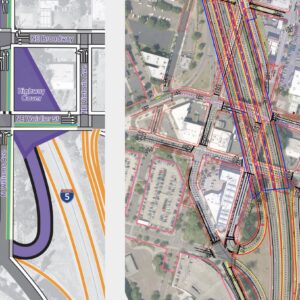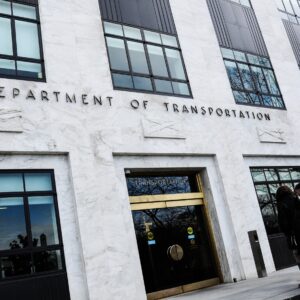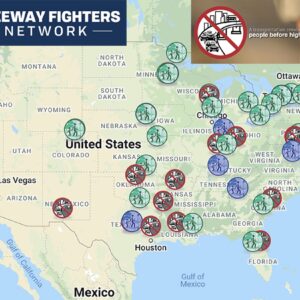“The more comments submitted… the more that elected officials will feel empowered to join us.”
– Aaron Brown, No More Freeways
When the Oregon Department of Transportation opened up their public comment period for the Supplemented Environmental Assessment of the I-5 Rose Quarter project, critics were ready to seize the moment.
Members of No More Freeways (NMF), one of the primary anti-I-5 expansion groups in Portland, have been mobilizing advocates against the project for years. Now they want to demonstrate widespread opposition to the project in the form of comments that will go directly to ODOT.
In order to simplify the process for people who want to comment, NMF created a public comment generator site that feeds directly into ODOT’s records. On the site, they ask people writing comments to share personal stories about how the proposed freeway expansion would harm them and/or their community.
They encourage creativity from commenters, but want to hammer home three main points:
- Lids, not lanes.
NMF says ODOT can fulfill their promise to reconnect the lower Albina neighborhood (once a thriving community of Black Portlanders) by capping the freeway without expanding it.
“We strongly support continued investment in the Albina neighborhood including the freeway lids, affordable housing and safer streets without also adding additional cars and air pollution into the neighborhood brought about by the significant freeway expansion below the surface level streets,” NMF states.
- The need for a full Environmental Impact Statement to study alternatives to expansion.
NMF has pursued legal action against ODOT on the grounds they are neglecting their due diligence by failing to conduct a full Environmental Impact Statement looking at other ways to solve traffic congestion, like tolling.
“ODOT must conduct a full Environmental Impact Statement to fully understand the direct impacts this proposed freeway expansion would have to the neighborhood streets, our children’s lungs, and the planet they stand to inherit,” NMF says.
- Concerns about ODOT’s transparency.
Rose Quarter project critics are concerned about several instances where ODOT has not been straightforward about their intentions and findings in order to make a case for the necessity of the lane expansion.
“ODOT has a terrible record with accountability and transparency to the public with the Rose Quarter Freeway Expansion,” NMF states.
They point to how the agency handled public records requests about project impacts, which Portland attorney Alan Kessler successfully took them to court for earlier this year. The judge who ruled against ODOT in this case determined the transportation department had acted with negligence, eroding public faith in government.
Since they launched their public comment generator last week, Brown said they’ve received over 100 responses drawing on these arguments. NMF has been sharing some highlights on Twitter. Here are a few of note:
“I have lived next to the freeway for 19 years! my whole life I have suffered from the pollution, the noise, and the gash down the middle of my neighborhood that left it unwalkable. freeway expansions have been proven over and over again to be ineffective in reducing traffic and lead to an increase in emissions. So what exactly are you spending all this money for?? Who benefits? Certainly not the people of Portland. Not the planet. Not the kids like me whose future is scarred by the fear of climate change. Invest in public transportation, clean energy, and PEOPLE!! Or if you insist on continuing this project out of greed and unwillingness to consider creative options, at least be honest about it.”
“I bicycle through the Rose Quarter area on my commute between downtown and NE Portland. I’m very concerned about the impact of ODOT’s Rose Quarter proposals on bicycle commuting, in particular the addition of a new off-ramp to N Williams that will make it even riskier to bike there than it is today. More broadly, it is essential that ODOT prepare a detailed Environmental Impact Statement that compares the costs and benefits of congestion tolling on the existing lanes with the costs and benefits of building additional freeway lanes and changing ramps. If congestion tolling can produce comparable or better congestion relief in a shorter timeframe at a substantially lower cost than widening the freeway, that needs to be placed side-by-side with freeway expansion for comparison.”
“In this time of extreme weather events brought about by unprecedented global warming, it is deeply irresponsible – and immoral, frankly – to continue spending billions of public funding dollars developing transportation infrastructure centered around driving. Your single highest priority for every single project in your portfolio should be reducing vehicle miles traveled. Spending vast amounts of money to widen freeways is literally madness, especially when you look at the data which shows that you can’t “solve” congestion by adding more capacity (you just move the bottlenecks to other places). You must do the full environmental impact study which will support everything in the above paragraph. This is for OUR future as Oregonians, get out of your ODOT bubble and do the right thing.”
NMF members know they’re fighting Goliath. But they say a demonstration of mass protest against the project in the form of public comments will set a standard for how people, including mainstream news outlets and elected officials, talk about it.
“The more comments submitted from everyday Portlanders demanding ODOT conduct an EIS, the more that elected officials will feel empowered to join us in demanding ODOT meaningfully study alternatives to expansion that don’t cost over a billion dollars and creat more traffic and air pollution,” Aaron Brown, a leader of NMF, told me.
“ODOT has such a powerful, well-funded PR machine…they’re going to do all kinds of things to manufacture consent for this project by downplaying dissent and hiding the truth about the congestion, air pollution and carbon emissions this expansion invariably will bring to the neighborhood. The more that we can demonstrate Portland supports restoring Albina by adding freeway caps without adding the air pollution inherent in more lanes, the less legitimacy ODOT will have insisting the projects must be linked.”
In addition to the public comment period, ODOT plans to host a Rose Quarter virtual public hearing on December 14. Brown told me NMF is planning a separate forum for people to share their thoughts in person, hopefully with elected officials present. The details are still being worked out, but stay tuned for more information.
You can find NMF’s public comment generator here. The public comment period will be open until January 4th.








Thanks for reading.
BikePortland has served this community with independent community journalism since 2005. We rely on subscriptions from readers like you to survive. Your financial support is vital in keeping this valuable resource alive and well.
Please subscribe today to strengthen and expand our work.
What should ODOT do? They’ve been directed by the state legislature to implement this project. Should they just refuse? As much as I oppose this project, I very much want state bureaus to do what our elected officials tell them to do.
Maybe we need to target the legislature to tell ODOT not to build the project. That would pretty much shut it down, and fast.
absolutely. Heartily encourage you to email your concerns to your legislator.
ODOT chose this project to “solve Rose Quarter congestion”. They could have chosen a different approach, and they still could change their approach now. In other cities, regional transportation agencies have built entire transit lines to address congestion – PATCO in Philly comes to mind.
ODOT only knows how to build highways, so that’s all they do. I would agree that target the legislature would be a good place to start